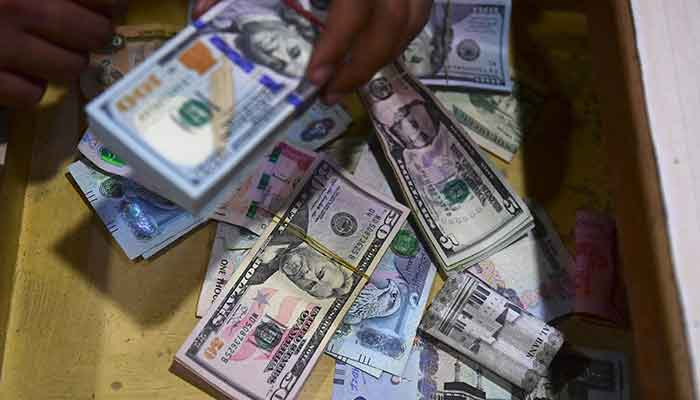Dollar crunch ties govt hands over syndicated financing
Govt will need to request KSA for continuation of deferred oil payment facility after maturity of existing agreement in Dec 2023
ISLAMABAD: The caretaker government has been facing a tough situation in arranging dollar loans for the import of petroleum products, as $3.3 billion syndicate financing from Islamic Development Bank (IsDB) might be available at over 10 percent interest rate.
All this has been happening amid increasing POL prices in the international market.
Amid scarcity of dollars, the government will need to request the Kingdom of Saudi Arabia (KSA) for continuation of deferred oil payment facility after the maturity of existing agreement in December 2023.
The KSA has so far disbursed $600 million from March to August 2023 and another $400 million was expected till the end of the year. Pakistani oil giants purchase crude oil worth $100 million on a monthly basis and then dispatch the bill to the Saudi authorities which, in return, transfer funds to the Government of Pakistan.
Now, the Ministry of Finance has consulted with the oil giants of the country and they suggested striking a deal with the IsDB for syndicate financing of $3.3 billion from 2023 to 2025, because their available financing cost might be higher than the interest rate of IsDB, keeping in view the prevailing mark-up rates in the domestic and foreign markets.
Out of the $3.6 billion financing from IsDB’s ITFC, $300 million were financed directly from IsDB but the remaining amount of $3.3 billion was required to be arranged through syndicate financing which was arranged from international banks. Now the commercial banks seemed more interested to invest in international bonds instead of allocating funds for syndicate financing.
The dollar inflows have remained a major headache for the economic managers of the country. It further multiplied in the wake of a surge in the interest rates around the globe, so arranging financing by the IsDB for International Trade and Finance Cooperation (ITFC) from commercial banks at lower rates seem impossible. The syndicate loans of $3.3 billion from IsDB will go beyond the rate of 10 percent.
Top official sources told The News that the total projected dollar inflows were estimated at $17.7 billion for the current fiscal year against the projected outflows of around $19.1 billion with a gap of $1.4 billion. The officials explained that out of the total projected outflows of $19.1 billion, there was the provision of a $7 billion rollover from China and KSA with interest payments of $256 million and $126 million respectively. “We assume that $7 billion is expected to be rolled over from friendly countries,” said the official.
The Ministry of Finance projected $4.5 billion commercial loans and secured $2 billion from the IMF during the current fiscal year. The ministry also planned to raise $3 billion through the launching of international bonds but the possibility of launching any bond in the first half (July-Dec) period seemed out of the question.
Keeping in view the country’s rating in global rating agencies and the macroeconomic situation, the cost of commercial borrowing escalated beyond imagination, so the choices were very limited before the economic managers.
Now the choice left with the government’s policymakers is disbursement of project and program loans that could be accelerated by ensuring speedy implementation of execution of projects and agreed conditions on account of program loans.
-
 King Charles Makes It ‘absolutely Clear’ He Wants To Solve Royal Crisis
King Charles Makes It ‘absolutely Clear’ He Wants To Solve Royal Crisis -
 Royal Family Warned To ‘have Answers’ Amid Weak Standing
Royal Family Warned To ‘have Answers’ Amid Weak Standing -
 Marc Anthony On Why Bad Bunny’s Super Bowl Show Mattered
Marc Anthony On Why Bad Bunny’s Super Bowl Show Mattered -
 Kid Rock Gets Honest About Bad Bunny’s Performance At Super Bowl
Kid Rock Gets Honest About Bad Bunny’s Performance At Super Bowl -
 Kylie Jenner Reveals Real Story Behind Her 'The Moment' Casting
Kylie Jenner Reveals Real Story Behind Her 'The Moment' Casting -
 Eva Mendes Reveals One Costar She Envied Ryan Gosling Over
Eva Mendes Reveals One Costar She Envied Ryan Gosling Over -
 Halsey Marks Fiancé Avan Jogia's Birthday With Emotional Note
Halsey Marks Fiancé Avan Jogia's Birthday With Emotional Note -
 China: Stunning Drone Show Lights Up Night Sky Ahead Of Spring Festival 2026
China: Stunning Drone Show Lights Up Night Sky Ahead Of Spring Festival 2026 -
 Andrew's Epstein Scandal: Will King Charles Abdicate Following King Edward's Footsteps?
Andrew's Epstein Scandal: Will King Charles Abdicate Following King Edward's Footsteps? -
 Billy Joel Leaves Loved Ones Worried With His 'dangerous' Comeback
Billy Joel Leaves Loved Ones Worried With His 'dangerous' Comeback -
 Prince William Dodges Humiliating Question In Saudi Arabia
Prince William Dodges Humiliating Question In Saudi Arabia -
 Dax Shepard Describes 'peaceful' Feeling During Near-fatal Crash
Dax Shepard Describes 'peaceful' Feeling During Near-fatal Crash -
 Steve Martin Says THIS Film Has His Most Funny Scene
Steve Martin Says THIS Film Has His Most Funny Scene -
 Kensington Palace Shares Update As Prince William Continues Saudi Arabia Visit
Kensington Palace Shares Update As Prince William Continues Saudi Arabia Visit -
 Fugitive Crypto Scammer Jailed For 20 Years In $73m Global Fraud
Fugitive Crypto Scammer Jailed For 20 Years In $73m Global Fraud -
 Will Andrew Mountbatten-Windsor Finally Go To Jail Now That King Charles Has Spoken Out? Expert Answers
Will Andrew Mountbatten-Windsor Finally Go To Jail Now That King Charles Has Spoken Out? Expert Answers




